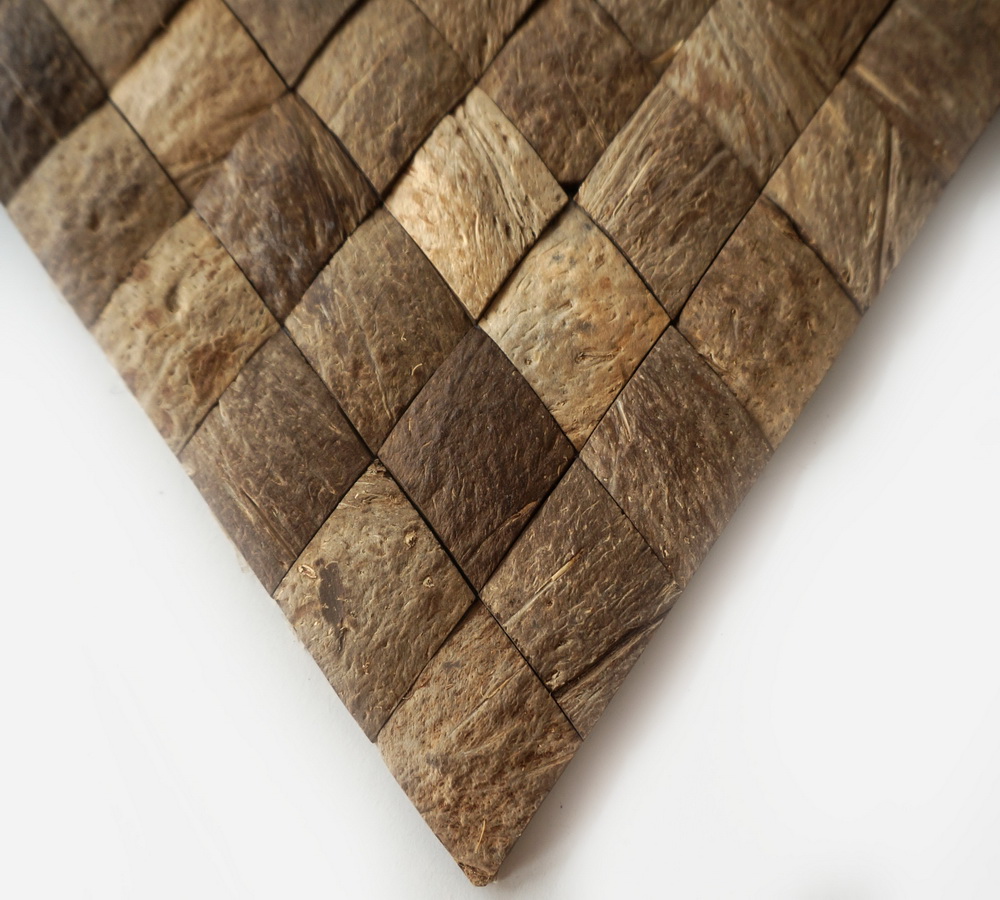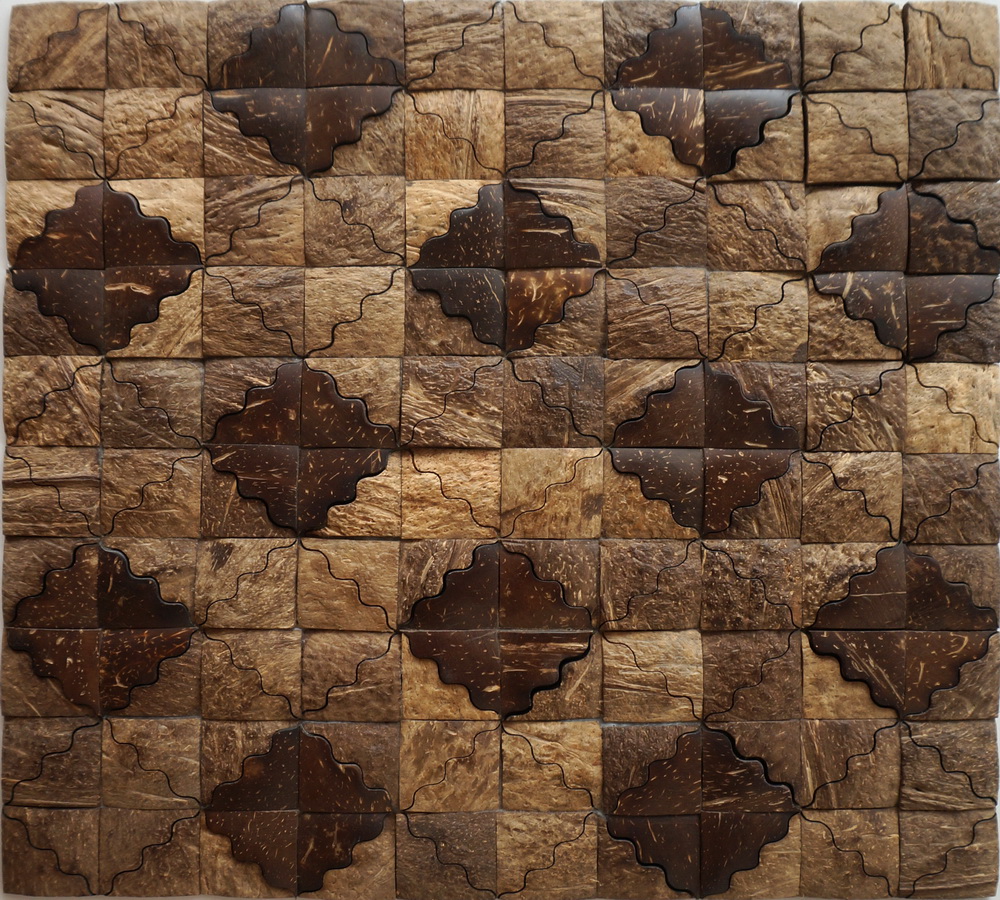Views: 0 Author: Site Editor Publish Time: 2025-05-12 Origin: Site
Are you looking for an eco-friendly solution to elevate your space? Coconut shell tiles offer a sustainable and stylish way to enhance interiors. They provide a unique natural texture and color, perfect for anyone aiming to go green.
In this article, you'll discover the many uses of coconut tiles in construction. From flooring to decorative accents, coconut tiles are versatile, eco-conscious, and durable.
Coconut tiles are manufactured from reclaimed coconut shells, which are often discarded in tropical regions, contributing to waste and environmental degradation. The process begins with the collection of these shells, which are then cleaned, dried, and treated to make them durable enough to be used as building materials. The shells are sliced into thin tiles or slabs, and sometimes even pressed into mosaic patterns. The tiles are finished with eco-friendly, low-VOC adhesives, which enhances the overall environmental appeal of these materials.
The tiles can be treated to highlight the natural texture of the coconut shell, providing a rustic, natural appearance with a variety of finishes. The ability to work with different textures and colors makes coconut tiles adaptable to a range of design styles, from modern minimalist to tropical and rustic.
Coconut shell tiles are widely used for flooring in both residential and commercial spaces. These tiles are not only sustainable but also remarkably durable, making them perfect for high-traffic areas. When used in homes, they provide a warm, natural ambiance and can be laid in a variety of patterns to suit different styles. Coconut tiles are also an excellent option for outdoor areas such as patios or decks, where they can withstand various weather conditions.
For wall applications, coconut tiles add a unique texture and visual interest. They can be used to clad the walls of living rooms, kitchens, or bathrooms, offering an eco-friendly alternative to traditional cladding materials like wood, tile, or drywall. These tiles can be applied as accent walls or cover entire walls, transforming the look of a room with their natural and exotic texture.
Ceiling tiles made from coconut shells are another growing trend. They provide a sustainable, attractive alternative to conventional ceiling materials like plaster or drywall. Their natural texture and color variations add a rustic charm, making them an ideal choice for those looking to bring a touch of nature into their interiors.
Coconut tiles can also be used as decorative accents in various spaces. They can be incorporated into furniture designs, backsplashes in kitchens, or even as frames for mirrors and artwork. Due to their distinct look, they provide a natural yet elegant touch that blends well with a wide range of other materials.
Some designers are incorporating coconut shell tiles into their furniture designs. By integrating the tiles into tabletops, cabinetry, or shelving units, coconut tiles add a natural, eco-conscious flair to furniture. These tiles offer a durable and visually unique surface for furniture pieces, combining both functionality and sustainability.

Coconut tiles are a highly sustainable material, as they are made from coconut shells that would otherwise be discarded as waste. The production process utilizes low-impact manufacturing methods, and the tiles are often made with zero or low-VOC adhesives, further enhancing their eco-friendliness. By repurposing coconut shells, the material helps reduce waste and offers a green alternative to more traditional building materials.
The production of coconut tiles has a low environmental footprint compared to other building materials. The use of coconut shells helps reduce the pressure on natural resources, such as wood, and the low emissions associated with the manufacturing process make it an ideal choice for those seeking to minimize their carbon footprint.
Coconut tiles are known for their durability, especially in high-traffic areas. Their natural strength and resistance to wear make them an excellent choice for long-lasting installations. With proper maintenance, coconut tiles can retain their aesthetic appeal and structural integrity for years.
One of the lesser-known advantages of coconut shell tiles is their ability to provide thermal insulation. In hot climates, they can help regulate indoor temperatures by reducing heat transfer, making them an excellent choice for homes in tropical regions or areas with extreme temperatures.
Coconut tiles are visually appealing, with each tile offering unique color patterns and textures due to the natural variation in coconut shells. This makes each tile a piece of art in its own right, giving interiors a natural, exotic vibe. The combination of light and dark shades, along with the natural grain patterns, adds depth and warmth to any room.

Coconut tiles are gaining popularity in the world of interior design, driven by the growing trend of sustainable living and the increasing demand for eco-friendly building materials. As more people become aware of the environmental impact of traditional materials, the desire for alternatives like coconut tiles is expected to grow.
Coconut tiles are not only environmentally friendly but also versatile and durable. They make excellent choices for both residential and commercial spaces. By using coconut tiles, you can add a sustainable touch to your project while ensuring long-lasting results.
At Ralart Mosaic, we are committed to providing high-quality mosaic and tile solutions that embrace sustainability. Our range of eco-friendly tiles, including coconut shell tiles, helps you make a stylish statement while contributing to a greener future. Explore our collection and start building your dream space with sustainable materials today.
Q: What are coconut tiles made of?
A: Coconut tiles are made from reclaimed coconut shells, which are cleaned, dried, and treated to create durable and eco-friendly tiles.
Q: Can coconut tiles be used for outdoor areas?
A: Yes, coconut tiles are perfect for outdoor spaces like patios or decks, as they are resistant to wear and various weather conditions.
Q: Are coconut shell tiles eco-friendly?
A: Absolutely! They are made from renewable coconut shells, reducing waste and utilizing sustainable production methods.
Q: How durable are coconut tiles?
A: Coconut tiles are highly durable and resistant to wear, making them suitable for high-traffic areas in both residential and commercial settings.
Q: Where can I purchase coconut shell tiles?
A: You can explore our collection of eco-friendly tiles at Ralart Mosaic. We offer a variety of sustainable tile options for your home or business.